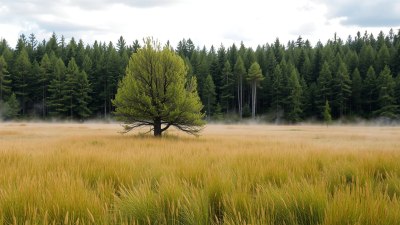When Every Journey Feels Like an Open World
Explore the concept of open-world journeys in gaming and real life. Discover the freedom and adventure of exploration.

Image created with Flux Schnell
In recent years, the concept of open-world experiences has transcended the realm of video games and seeped into our everyday lives, transforming how we perceive journeying and exploration. The term 'open-world' initially referred to a genre of video games where players have the freedom to roam vast landscapes filled with quests and surprises, but it quickly evolved into a metaphor for the journey of life itself. This article delves into the essence of what makes every journey feel like an open world, both in the gaming context and in our day-to-day experiences.
Open-world gaming revolutionized the way we play, offering a sandbox-style experience where players are not constrained by linear narratives or rigid structures. Instead, they are invited to carve their own paths, discover hidden gems, and engage with a vibrant ecosystem that reacts to their actions. Popular titles like 'The Legend of Zelda: Breath of the Wild', 'Skyrim', and 'Grand Theft Auto V' embody this philosophy, providing players with rich environments that beckon exploration and creativity.
This paradigm of open-world gaming underscores a powerful psychological aspect of human nature: the innate desire for exploration and discovery. As human beings, we are hardwired to seek out new experiences and navigate through unfamiliar territories. In a digital world teeming with detailed lore and intricate designs, players are granted the ultimate freedom to set their own goals and write their own stories.
So how does this concept extend beyond the pixels of a game? The answer lies in the fundamental parallels between gaming and real-life journeys. Just like in an open-world game, our lives are characterized by choices, challenges, and chances for discovery. Life presents us with a vast landscape, dotted with opportunities waiting to be explored. Whether it’s traveling to a new city, embarking on a personal project, or navigating relationships, every decision can lead us to unforeseen adventures.
The Psychology of Exploration
Psychologists have long studied the motives behind human exploration. Theories suggest that exploration is not just a quest for knowledge but also a way to foster personal growth and self-understanding. This aligns perfectly with the essence of open-world games, where players undergo transformative experiences as they uncover the world around them. In both gaming and reality, exploration is linked to feelings of competence, autonomy, and connection.
When players venture into a digital realm, solving puzzles or engaging in combat, they emerge with a sense of accomplishment and empowerment. Similarly, when individuals traverse through life’s challenges, be it overcoming personal obstacles or embracing new cultures during travel, they often reflect on these experiences as pivotal moments that define their character and growth.
Create Your Own Journey
Much like a protagonist in an open-world game, we have the agency to chart our own courses through life, armed with the freedom to make decisions that shape our experiences. As we navigate our personal landscapes, it is essential to embrace the open-world mindset: one that encourages curiosity, adaptability, and resilience.
This involves embracing the unexpected, much like players who stumble across side quests or hidden treasures in their games. It’s about seeking learning opportunities in every encounter, valuing the journey over the destination, and recognizing that even detours can lead to beautiful discoveries.
Travel as an Open-World Experience
Traveling epitomizes the open-world journey, giving individuals the chance to immerse themselves in diverse cultures and environments. Each trip becomes a tailor-made adventure, where wanderers choose their paths, encounter local customs, and interact with residents in meaningful ways. The exhilaration of not knowing what lay ahead hones a traveler’s instincts and opens them up to serendipitous experiences.
Imagine strolling through the lively streets of Tokyo, overwhelmed by the appetite for exploration and all it encompasses. Every corner offers something new, from street food vendors to hidden temples. In this sense, travel mirrors the much-loved open-world games; the world offers up its secrets, but it requires inquisitiveness and patience to uncover them.
Technology and Open-World Dynamics
As technology continues to evolve, it has further blurred the lines between digital experiences and reality. Virtual and augmented reality (VR and AR) have paved the way for even more immersive explorations, allowing players and users to experience worlds in incredibly realistic ways. Through these technologies, we can create our own open worlds within our homes or while traveling, experiencing the real world through different lenses.
Applications designed for travel, such as interactive maps or AR guides, allow us to explore unfamiliar cities in ways that resemble navigating through a digital landscape. Instead of merely being passive observers, technology enables us to interact with our surroundings actively. This heightened sense of agency reflects the spirit of open-world gaming. We’re not simply tourists, but explorers, forging our paths in lively destinations worldwide.
Social Interactions Along the Journey
Open worlds are characterized by dynamic social interactions, where players encounter NPCs (non-playable characters) and engage in a variety of dialogues and quests. This mimics human society, where our interactions profoundly shape our journeys. Friends, family, and even strangers can guide us, challenge us, and inspire us to take bold steps forward.
In social contexts, a single conversation can ignite passions, initiate plans, or lead to various shared experiences. Much like a player forging alliances or forming relationships within their game environment, our social interactions can create the network of support we need to explore uncharted territories in life. They remind us that we are not alone in our journeys and that the tapestry of our lives is woven with others’ experiences and insights.
The Role of Goals and Challenges
A crucial aspect of gaming involves setting goals and overcoming challenges. Every quest turned into a mission contributes to a sense of progression and achievement. In our lives, we too must set goals—whether they be personal, professional, or relational. Accomplishing these goals provides a sense of fulfillment, akin to leveling up within a game.
Of course, just like in games, we encounter challenges along the way. These obstacles can often feel daunting. However, it is vital to view these challenges as opportunities for growth. The game characters often have to improve skills, gather resources, or seek mentorship to overcome adversities; we too must embrace a growth mindset, viewing setbacks as part of an expansive journey through life.
Savoring the Process
In a fast-paced world where success is often defined by tangible results, the open-world mindset encourages us to savor the process of exploration. Every interaction, every unexpected encounter, every time you embrace spontaneity contributes to the larger narrative of your journey. Just as players take the time to appreciate the scenery, engage with various side quests, or build relationships within the gaming universe, we must prioritize the journey itself rather than just the end result.
This mindfulness fosters a deeper connection to the world around us, turning every day into an opportunity for exploration. Whether it means taking a different route to work or picking up a new hobby, redefining our perspectives can lead to a life rich with adventure and discovery.
Life as an Open World
Ultimately, every journey can feel like an open world if we allow ourselves the agency to explore it fully. By adopting an open-world mindset, we encourage exploration and self-discovery in our professional careers, personal relationships, and everyday lives. As we traverse this journey, we can delight in the beauty of uncertainty, celebrate our victories, and learn from our challenges.
Just like that sprawling digital landscape filled with mysteries and surprises, the world around us is teeming with experiences waiting to be uncovered. All we must do is step out, take risks, and embrace the adventure that awaits. In doing so, we transform our journeys into open-world experiences, rich with possibility and profound connections.











